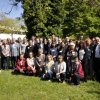An ambitious international project to support the development of low-carbon energy and industry in Southern and Eastern Europe got under way 13th May 2019 with funding from the European Union. Headed by the French geological survey, BRGM, the research partnership combines the expertise of 17 partners from ten European countries in the field of carbon capture, utilisation and storage (CCUS), a technology considered crucial to climate action. Central Mining Institute is pleased to be partner of this project.
In 2017, the International Energy Agency warned that CCUS technologies were not developing fast enough to meet emissions reduction targets laid out in the Paris Agreement.
The STRATEGY CCUS project aims to meet this challenge in eight regions identified as promising for CCUS by producing local development plans and business models tailored to industry’s needs. The plans will also define carbon dioxide (CO2) transport corridors between local CCUS clusters of industry, and connecting with North Sea CCUS infrastructure, in order to reduce costs and contribute to a Europe-wide CCUS infrastructure.
The project team, which intends to develop plans in close cooperation with stakeholders, will also provide methodologies and examples of best practice for potential CCUS developers, for areas such as public acceptance, stakeholder engagement, lifecycle analyses and techno-economic assessments.
The promising start-up regions were selected within 7 countries – Spain, France, Greece, Portugal, Croatia, Romania and Poland – representing 45% of Europe’s CO2 emissions from the industry and energy sectors (EEA, 2016). They feature elements considered ideal for CCUS development, such as clusters of industry, CO2 storage and/or utilisation opportunities and the potential for hydrogen production and use.
The eight start-up regions identified by the STRATEGY CCUS project team are:
1. Paris basin in France (including Le Havre CCS cluster targeted SET Plan Action 9, Dunkerque, Paris urban area and Orleans agricultural area)
2. Rhône valley in France (including the Fos-Berre/Marseille CCU cluster targeted by the SET Plan Action 9 (as a Flagship Project), and Lyon metropole)
3. Ebro basin in Spain (including Tarragona industrial area, North Castellón and North Teruel areas)
4. Lusitanian basin in Portugal (including CO2 sources in the Leiria-Figueira da Foz axis, and extending to the Lisbon industrial region)
5. Northern Croatia (including Zagreb and the Croatian part of Pannonian basin)
6. Galati area in Romania (including Galati, a port town on the Danube river, and its surroundings)
7. West Macedonian area in Greece (including the Kozani and Ptolemaida industrial areas)
8. Upper Silesia in Poland (including the industrial areas of Katowice, Rybnik and Będzin).
Dr Fernanda M L Veloso, of BRGM and project coordinator, said: STRATEGY CCUS is crucial to paving the way for operational CCUS sites from the early 2020s, as it will elaborate on the feasibility plans of promising regions and take into account technical, economical and societal aspects. Countries bordering the North Sea are already discussing plans for CCUS development and offshore geological storage. There is thus an urgent need for the rest of Europe to engage in strategic planning for CCUS development, giving priority to local solutions before looking at wider European connection schemes.
The STRATEGY CCUS (Strategic planning of Regions and Territories in Europe for low-carbon energy and industry through CCUS Coordination and Support Action) project has received funding from the European Union’s Horizon 2020 research and innovation programme under grant agreement No 837754. It involves partners from ten European countries:
- France: BRGM, IFP Energies nouvelles, Total S.A.
- Spain: IGME, CIEMAT
- Portugal: University of Evora, DGEG, CIMPOR, FCT-NOVA
- Greece: CERTH
- Croatia: UNIZG-RGNF
- UK: Scottish Carbon Capture & Storage / University of Edinburgh
- Romania: SNSPA, GeoEcoMar
- Poland: GIG (Central Mining Institute)
- Germany: Fraunhofer ISI,
- Norway: NORCE



